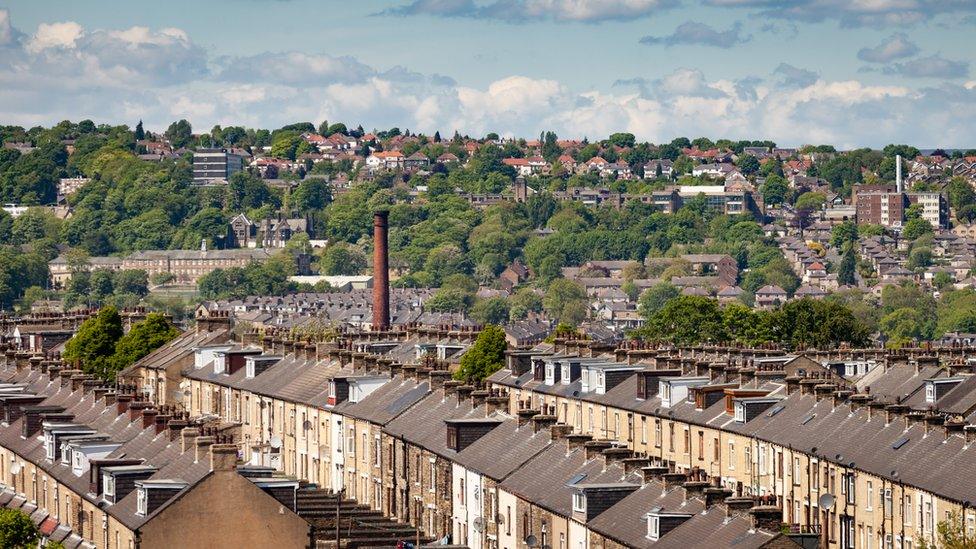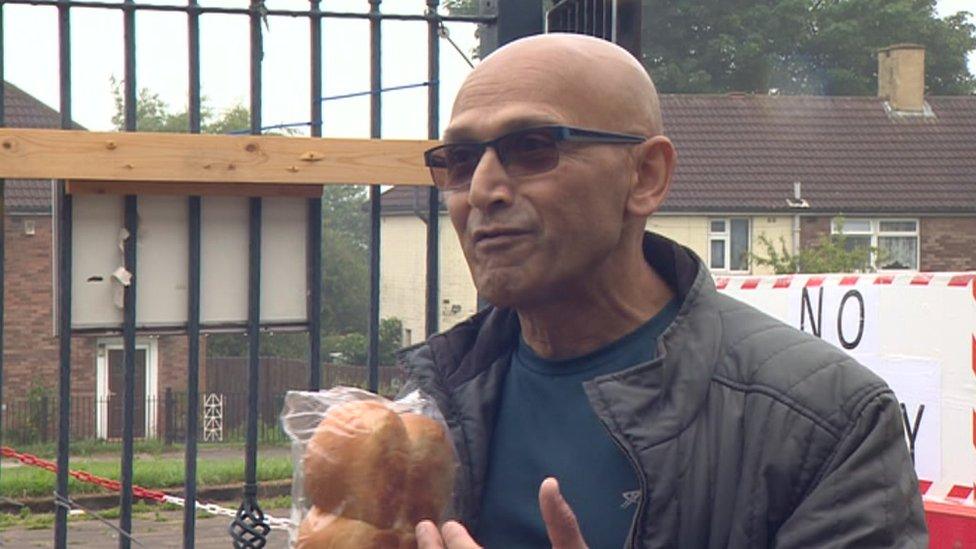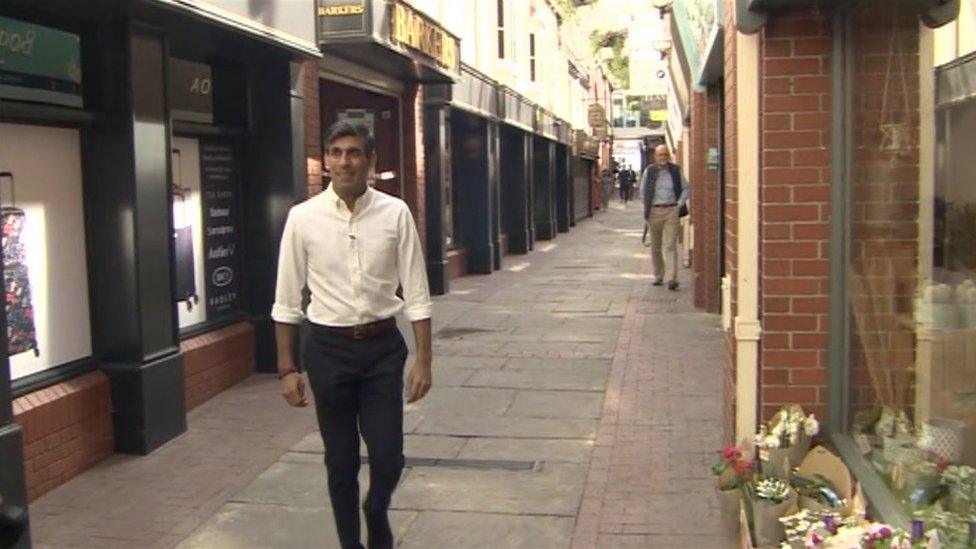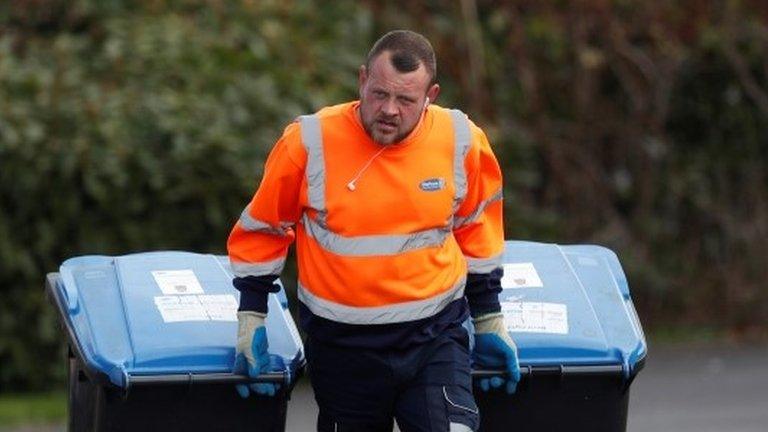Mayor calls austerity an 'act of national self-harm'
- Published

Cities such as Bradford are said to have been hit worse by austerity
Austerity was an "act of neglect and an act of national self-harm", according to a regional mayor.
Labour MP Dan Jarvis was speaking on the 10th anniversary of George Osborne's 2010 austerity budget which saw large cuts in public spending.
A centre-left think tank said the cuts had left the north less resilient to deal with the pandemic and recession.
Chancellor Rishi Sunak said there had been record increases in funding for local councils in recent years.
Mr Jarvis, mayor of the Sheffield City Region, accepted that following the financial crisis public sector savings were needed, but said the extent of the reduction in public spending had restrained growth, particularly in northern England.
'In it together'
"The choking off of the economic recovery has had a devastating impact on communities right across the North and that's why I describe it as an act of neglect and an act of national self-harm," he said.
George Osborne said in 2010 the country was "all in this together" but the Institute of Public Policy Research North (IPPR North) said it had had more impact in the North.
The centre-left group said the North had seen more public sector job losses than in England as a whole. It also pointed to lower council spending per head of population than the national average, and a lack of investment spending.
All of this, the organisation said, had eroded the north's resilience and its ability to cope with the coronavirus pandemic and any resulting recession.

Analysis
James Vincent, Political Editor BBC Yorkshire
Ten years ago George Osborne stood up in the House of Commons and said, "We're all in this together."
But places like Barnsley might turn round, a decade on and ask, "Are you sure about that?"
Some councils have lost a third of their budgets. Barnsley has lost 40 per cent of its council jobs. That's having an impact on how towns cope with the pandemic.
Councils are the front line for the long-term Covid-19 recovery in Yorkshire - but they're not sure if they've got the money to do it.
They've not publicly talked about going bust before. They are now.

The impact of government spending cuts has been felt by councils of all political colours, and all are increasingly reliant on locally-raised revenue rather than government grants.
In Labour-controlled Bradford the council has cut £278m off its budget over the last decade.
Local resident Pravin Patel uses a food bank in the city, run by the Sandale Trust.
He said: "I've never seen it worse. I look at the number of people who come here and I look at the kids and the clothes that they are wearing, it reminds me of when I was growing up… when we had nothing.
"If you come out of the city centre and you come into the suburbs or the estates then you see what true poverty is like."

Pravin Patel said people who needed help were getting overlooked "time and time again" by the government
As well as a food bank, the Sandale Trust also runs a community centre and youth clubs. However, they have cut back some services due to a lack of funding.
The trust's youth and community development manager, Shannon Worsley, said: "It angers me. I feel like [youngsters are] being let down because they don't have the chances that other generations have had, or that they could have if there were more money around."
In Bradford, a third of the local authority's budget came from council tax receipts in 2010. Now it is more than 50 per cent.
It is still having to provide the same services, and the lion's share of council spending goes on looking after the elderly, and vulnerable adults and children.
"We are spending about half now than what we used to spend in 2010 and that makes a huge difference to our communities," council leader Susan Hinchcliffe said.
In Conservative-controlled North Yorkshire it is a similar picture, with a third of its spending power reduced over the last decade.

Chancellor Rishi Sunak is MP for a northern seat
To address what it says are the results of a decade of austerity, IPPR North says the government has to match its "levelling up" rhetoric with policy actions.
It must learn lessons from the past and reverse austerity, increase the speed of devolution and invest in the north, it said.
Speaking in Northallerton Rishi Sunak, who is the MP for Richmond, North Yorkshire, said: "Through this crisis we've provided an extra £3bn to help councils carry out the vital work that they're doing.
"Councils are on the front line of driving our recovery after being on the front line of helping us through this crisis.
"Levelling up remains at the heart of our agenda and we want to double down on it."

Follow BBC Yorkshire on Facebook, external, Twitter, external and Instagram, external. Send your story ideas to yorkslincs.news@bbc.co.uk or send video here.
- Published17 June 2020

- Published17 June 2020
